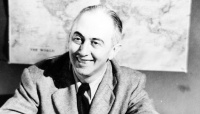Paul Winkler
| Paul Winkler | |

| |
| Biographical information | |
| Founded: | {{{Founded}}} |
|---|---|
| Country: | |
| Website: | N/A |
Paul Winkler was a French publisher and editor.
Biography
Paul Winkler was born in Budapest, then in Austro-Hungarian Empire, on July 7, 1898. He left his country through Germany, for going to study at the University of Amsterdam in Netherlands before coming in Paris, France, where he created a press agency called “Opera Mundi”.
After having contacted the American “King Features Syndicate” (KFS), he was able to transform “Opera Mundi” in a kind of European relay for the KFS comics, and amongst them “Mandrake the Magician”. In following years, he brought to French public the most famous American comics and became also one of the leading figures in the national press.
His bigger success as a comics editor was Le Journal de Mickey, founded in 1934.
Having migred in New York during the World War II, he worked for the foreign section of the “Washington Post” and published several books.
Coming back in France in 1944, the paper shortages of the post-war period forced him to merge “Le Journal de Mickey” with Hop-là! to create “Le journal de Mickey et Hop-là ! réunis”.
In 1945, he relaunched its activities with the women's magazine Confidences and two years later founded another comics weekly title, Hardy présente "Donald".
After the second World War, a new regulation on comics were introduced (law of the 16th July 1949) as they were accused to corrupt youth, particularly comics of American origin. The latter were very restricted, a context to which Paul Winkler tried to oppose in vain his views against that censorship and he was finally led to stop publishing "Hardy présente "Donald" in 1953. Concerning the pressures from the Surveillance and Control Commission, joint body responsible (1949 law) for a posteriori control of publications : see [1] (article in French).
However in 1952 he was able to relaunch a new series of Le Journal de Mickey (still published) with a even bigger success than the pre-war series with 700 000 copies each week at the time.
Associated with the Hachette publisher, he became director of the national newspaper “France Soir” from 1976 to his death in 1982.